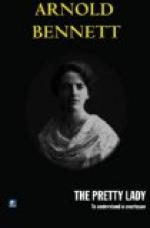He went into the drawing-room, and there, by the fire and in front of a formidable blue chair whose arms developed into the grinning heads of bronze lions, stood the lacquered table consecrated to his breakfast tray; and his breakfast tray, with newspaper and correspondence, had been magically placed thereon as though by invisible hands. And on one arm of the easy-chair lay the rug which, because a dressing-gown does not button all the way down, he put over his knees while breakfasting in winter. Yes, he admitted with pleasure that he was “well served”. Before eating he opened the piano—a modern instrument concealed in an ingeniously confected Regency case—and played with taste a Bach prelude and fugue.
His was not the standardised and habituated kind of musical culture which takes a Bach prelude and fugue every morning before breakfast with or without a glass of Lithia water or fizzy saline. He did, however, customarily begin the day at the piano, and on this particular morning he happened to play a Bach prelude and fugue.
And as he played he congratulated himself on not having gone to seek Christine in the Promenade on the previous night, as impatience had tempted him to do. Such a procedure would have been an error in worldliness and bad from every point of view. He had wisely rejected the temptation.
In the deep blue arm-chair, with the rug over his knees and one hand on a lion’s head, he glanced first at the opened Times, because of the war. Among the few letters was one with the heading of the Reveille Motor Horn Company Ltd.
G.J. like his father, had been a solicitor. When he was twenty-five his father, a widower, had died and left him a respectable fortune and a very good practice. He sold half the practice to an incoming partner, and four years later he sold the other half of the practice to the same man. At thirty he was free, and this result had been attained through his frank negative answer to the question, “The law bores me—is there any reason why I should let it continue to bore me?” There was no reason. Instead of the law he took up life. Of business preoccupations naught remained but his investments. He possessed a gift for investing money. He had helped the man who had first put the Reveille Motor Horn on the market. He had had a mighty holding of shares in the Reveille Syndicate Limited, which had so successfully promoted the Reveille Motor Horn Company Limited. And in the latter, too, he held many shares. The Reveille Motor Horn Company had prospered and had gone into the manufacture of speedometers, illuminating outfits, and all manner of motor-car accessories.
On the outbreak of war G.J. had given himself up for lost. “This is the end,” he had said, as a member of the sore-shaken investing public. He had felt sick under the region of the heart. In particular he had feared for his Reveille shares. No one would want to buy expensive motor horns in the midst of the greatest war that the world, etc., etc.




